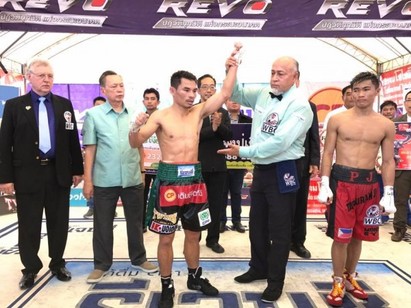 Earlier today WBC Minimumweight champion Wanheng Menayothin (51-0, 18) [วันเฮง ไก่ย่างห้าดาวยิม], aka Chayaphon Moonsri, recorded his 10th world title defense and moved ahead of Floyd Mayweather Jr in regards to unbeaten records. In fact if Wanheng retired later this week he would have the most statistically impressive record of any unbeaten world champion, but what does 51-0 actually mean? How impressive is Wanheng's unbeaten record? And what value do we get from digging into the numbers? The Thai made his debut way back in January 2007, beating fellow debutant Roel Gade of the Philippines. At the time Wanheng was 21 years old and not someone who was immediately tipped as being a future boxing success. Despite that it wouldn't take long for Menayothin to claim his first title, winning the WBC Youth Minimumweight title just 2 months later, in his third bout, by stopping Yiming Ma of China. Wanheng's reign as the Youth champion followed a similar reign from countryman from Oleydong Sithsamerchai, aka Kittipong Jaigrajang, who made 16 defences between October 2002 and August 2006. As the Youth champion Wanheng would record 8 defenses, winning the title in March 2007 and making his final defense in October 2009. Those defenses included wins against a number of novices as well as decent Filipino fighters like Armando de la Cruz and Ardin Diale. Wanheng second professional title was the interim WBC International Minimumweight title, which he won against Jayson Rotoni in December and defended twice before winning the WBC International silver title, defending that 3 times between January 2011 and September 2011. It was whilst defending that title that Wanheng would record his first victory over a former world champion, defeating former IBF king Florante Condes in June 2011. 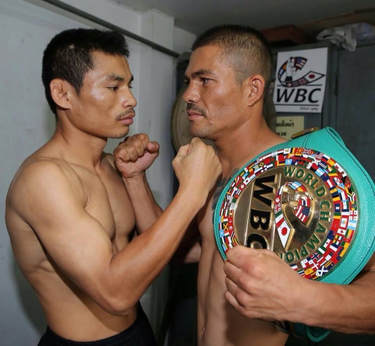 The full version of the WBC International Minimumweight title was the next for Wanheng to claim, in November 2011, and he would hold that title for several years whilst building up his unbeaten record and edging up the WBC rankings. In 2014 he had become the WBC mandatory challenger, and was waiting for a world title shot. By the end of his waiting period he was 35-0 (11) and was securing a long awaited shot as WBC king Oswaldo Novoa, who had upset Xiong Zhao Zhong for the belt in China and recorded his first defense, stopping Alcides Martinez. Despite being the challenger Wanheng seemed to be the boss for the most part, before stopping Novoa in the 9th round to claim the WBC Minimumweight title, a title he still holds now, almost 4 years later. As a champion Wanheng's reign has been a mixed back. Hisfirst two defenses came against Filipino challengers Jeffrey Galero and Jerry Tomogdan, neither of which really seemed like suitable challengers. The gutsy Galero lasted 12 rounds before losing a decision whilst Tomogdan was stopped in 9 rounds. Following those bouts was a stay busy contest, something we often see Thai's take part in with greats like Pongsaklek Wonjongkam fighting in them to stay sharp and keep a pay cheque coming in, against Ardi Buyung. Just a month later he would record his third defense, stopping Korean puncher Young Gil Bae in 9 rounds. Next was Japanese challenger Go Odaira, who lasted less than 5 complete rounds with the Thai. Another stay busy bout, this time against Edo Anggoro, allowed Wanheng to tune his skills before a mandatory defense in August 2016 against talented Mexican Saul Juarez. Juarez was competitive through out but was out pointed over the 12 round distance. 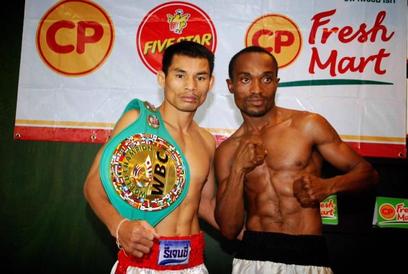 Following the mandatory against Juarez was another stay busy in December 2016 against Silem Serang. The next month Wanheng would score his 6th defense, narrowing over-coming the hungry Melvin Jerusalem. That was the start of a busy year for the Thai who would fight stay busy bouts in March, against Jaysever Abcede, and August, against Jack Amisa, as well as world title defenses against Omari Kimweri in June and former WBO champion Tatsuya Fukuhara in November. To begin 2018 Wanheng would make a mandatory defense against Panamanian youngster Leroy Estrada. Estrada proved to be a boy against a man and was dropped at will be Wanheng en route a 5th round stoppage win for the Thai, who reached 50-0 with the victory, tying the record of Floyd Mayweather Jr. A record he surpassed earlier today when he defeated Filipino challenger Pedro Taduran in his 10th defense. Few will suggest that Wanheng is one of the all time greats, or a future hall of famer. His 51-0 record looks great on paper but the quality hasn't been fantastic and if we're being honest he's never come close to really proving his quality. There's been chances to unify, with fighters like Katsunari Takayama, Knockout CP Freshmart, Hiroto Kyoguchi, Byron Rojas, Ryuya Yamanaka and even Kosei Tanaka all having had world title reigns and making for attractive bouts with Wanheng. Though none ever came off, the closest we got was his his bout with Fukuhara, who had lost the WBO title 3 months earlier. There is also a case to be made that he should have moved up in weight if he really wanted to prove himself. Whilst that does hold some weight he deserves some serious credit for making 105lbs right through his career. A fighter sticking at one weight, Heavyweight aside, through a 10 year career is impressive. It's a sign of his commitment to making weight and how strong he can be at one weight. A very valid criticism, along with his competition, is his lack of travel. Everyone of his 51 fights has been in Thailand. Whilst not all great fighters travel, it's hard to believe that he didn't get good offers to fight in Japan, the Philippines or Mexico. It would have been really interesting to have seen him travel and fight on the road. Travelling to Tokyo or Osaka to fight a leading contender in Japan, or Tijuana to face a leading Mexican or Manila to face one of his string of Filipino challengers. At the age of 32, an age that many Minimumweights have outgrown the division or retired, one thing that Wanheng really deserves a lot of respect for is his longevity. It's impressive to fight 51 times, something that most fighters don't do, but the fact he's now surpassed over 400 professional rounds is also a real credit. He's not got much in terms of wear and tear and given his relative lack of power his bouts are going long, with 13 compete 12 rounders under his belt including 6 in world title bouts. 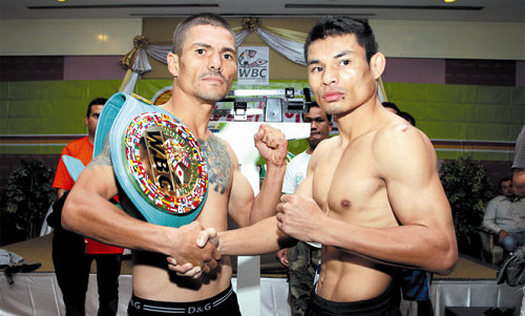 So on to the numbers: Reigning world champions faced:1 Oswaldo Novoa Former world champions beaten: 3 Florante Condes, Oswaldo Novoa and Tatsuya Fukuhara World title defenses: 10 Jeffrey Galero - UD12, Jerry Tomogdan - KO9, Young Gil Bae - TKO9, Go Odaira - TKO5, Saul Juarez - UD12, Melvin Jerusalem - UD12, Omari Kimweri - UD12, Tatsuya Fukuhara - UD12, Leroy Estrada - TKO5 and Pedro Taduran - UD12 Countries fought in:1 (Thailand) World titles won: 1 WBC Minimumweight Total title bouts: 33 Debutants faced: 2 Roel Garde - UD6 Kuk Chol Jon - TKO6 Record: 51-0 (18) Career rounds: 411
0 Comments
With it being 5 years to the day that Naoya Inoue [井上尚弥] claimed his first professional title, defeating Ryoichi Taguchi [田口良一] for the Japanese Light Flyweight title we thought it an ideal time to look at what we feel were Inoue's 5 best career performances, and document some major events in the “Monster's” career so far.
the right eye from the relentless jabs and hooks Inoue had landed. It was a performance that instantly turned Inoue from a prospect to a contender, winning the Japanese title just a few months later.
The win got Inoue some consideration for the 2014 Fighter of the Year awards, completing an astonishing rise to stardom, and saw him begin his second reign as a champion. Narvaez has since gone on to fight for the WBO Bantamweight title, sharing the ring for 12 tedious rounds with Zolani Tete.
The bout was the gut check that Inoue really needed, and a chance to show that he was more than just an offensive monster. It wasn't a flawless performance but it was a big win, and statement, stopping a fighter who had never been stopped before and had been a staple at the world level for close to a decade.
McDonnell's camp had been confident of making the weight with no issues but the reality was that McDonnell was unfit getting into the ring. He looked like he was mentally and physically ruined and as soon as Inoue tagged him clean he looked like he had felt something he had never felt before. It wasn't a 100% fit McDonnell, but Inoue's performance but the Bantamweight division on alert and secured his place in the World Boxing Super Series (WBSS) as the tournament favourite.
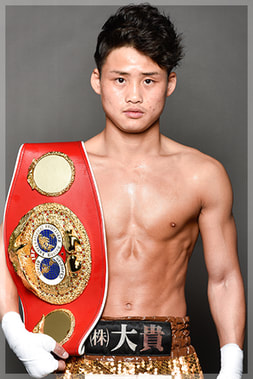 Earlier this week Hiroto Kyoguchi (10-0, 7) [京口 紘人] confirmed that he would be making a fully fledged move to Light Flyweight, and would be returning to the ring on September 25th to take on unbeaten Indonesian prospect Tibo Monabesa (18-0-2, 8), in what is an excellent match up to introduce Kyoguchi to the 108lb weight class. The plan is, if Kyoguchi defeats Monabesa at least, for the Watanabe gym fight to move into a bout with WBA super champion Hekkie Budler (32-3, 10) in late December. Although Kyoguchi Vs Budler looks to be “agreed in principle”, the move up in weight for Kyoguchi does leave the already strong Light Flyweight division with some more dream match ups, and it was a division with more than a handful of those to begin with. With that in mind we've had a look at 3 possible wars for Kyoguchi to get involved in down the line, though the reality is this list could easily have gotten to 10 or so bouts! Vs Ken Shiro (13-0, 7) We don't get enough all-Japanese world title bouts, which is a huge shame, but it's hard not to salivate over a potential bout between the all action Kyoguchi and the baby faced Ken Shiro to decide the #1 in Japan, if not the world, at 108lbs. Kyoguchi, at 24, would be the younger man and naturally the bigger puncher, but whether he could apply his trade mark pressure on the intelligent and technically excellent Ken Shiro would be a major question. If Kyoguchi could apply his pressure another massive question is whether or not Ken Shiro would be able to get Kyoguchi's respect in the pocket, and provide a more durable target himself than the fighters that Kyoguchi had been beating at Minimumweight. As the WBC champion Ken Shiro has already defeated the likes of Pedro Guevara, Gilberto Pedroza and Ganigan Lopez. He has proven himself to be a real talent who has matured as the champion, and his knockout of Lopez earlier this year showed how much more confidence he has now he's the champion. He's certainly not unbeatable, but the longer his reign as a world champion goes the more accomplished his boxing will become. Sadly the biggest issues with this bout taking place is television, with Kyoguchi's promoter working with TBS whilst Ken Shiro is being built as a star by Fuji TV. It's unlikely that either man would want to leave their current network, but it's a great potential bout, that could happen down the line. Vs Angel Acosta (18-1, 18) Whilst Ken Shiro is the most proven Light Flyweight champion, at the moment, it could be argued that the most dangerous is the once beaten WBO king pin Angel Acosta. The 27 year old Puerto Rican has shown a willingness to travel and has fought in front of a Japanese audience before, battling Kosei Tanaka in May 2017 when he suffered his sole defeat. With Kyoguchi being a big puncher himself this has the makings of being something special. Following his loss to Tanaka we've seen Acosta go on to win the WBO world title and made one defense back in June against Carlos Buitrago, a man that Acosta and Kyoguchi have both stopped. Having been out of the ring since June we suspect that Acosta will be looking to fight a notable name on his return and what would be better than travelling over to Japan to take on another of their young upstarts? For Kyoguchi the bout would be all about trying to out do Tanaka's unanimous decision over Acosta and ripping the title from the champion. It wouldn't be a simple task at all, and Acosta isn't just a tough fighter but someone with a reputation of being a very dangerous fighter, much like Kyoguchi. If Kyoguchi decided to go to war with Acosta he could be made to pay and dragged through hell, win or lose. This one makes a lot of sense, if the Budler bout falls through, and would almost certainly be fire works from the opening round. There's no television deal in the way and the only real problem could be a potential mandatory defense that Acosta might have to deal with sooner rather than later. Felix Alvarado (33-2, 29) Acosta is probably the most dangerous champion at 108lbs, but Alvarado has the title as the most dangerous fighter in the division. At the moment the Nicaraguan 29 year old doesn't hold a world title, though will be fighting or the vacant IBF title on October 21st against Randy Petalcorin. Given the timing there is almost no chance that he will be available again to fight in December, but in 2019 he'll certainly be looking to stay busy. Alvarado is, without a doubt, one of the most avoided men in the sport. Both of his losses have come at world level, to Kazuto Ioka and Juan Carlos Reveco, and neither man really wanted to go toe-to-toe with Alvarado, who has improved since those defeats. He has gone 15-0 (14) since the back-to-back defeats and stopped notable contenders like Luis de la Rosa, Karluis Diaz, Jose Antonio Jimenez and Fahlan Sakkreerin Jr during that run. Kyoguchi, as mentioned, holds a win over Buitrago but his countryman is a totally different kettle of fish. Unlike Buitrago we wouldn't be seeing Alvarado back off him. Instead we could see Kyoguchi being forced to box off the back foot, and that would tell us a lot more about the Japanese fighter. If he elects to stand toe-to-toe with Alvarado he in real danger, though we can't help but feel like he will, at some point. From the perspective of wanting to see two fighters who like putting opponents away face off this is probably the most mouth watering bout at 108lbs, and is one that is really hard to call. As with Acosta we know that Alvarado will travel and would go to Japan for the right money! (Image courtesy of http://www.watanabegym.com) Earlier this week Fuji Next did one of their Diamond Glove shows where they show fights from the past. One of those bouts was Yohei Tobe the Japanese Super Flyweight title victory against Taiki Eto from back in April 2014. That bout saw Tobe stop Eto in the 9th round to advance his record to 8-1-1 (5) and had him claim his first professional title. It was a coming together of what Tobe was supposed to be, the Misako man beginning to deliver on his promise and potential. Sadly however he never really managed to deliver with the consistency that he needed and instead of being one of the stand out Japanese fighters of his era, as some had tipped when he turned professional, he was a fighter who will be forgotten to annals of time. Or a fighter who will be remembered as a “what if?” story. A real shame given the expectations on his shoulders and the incredibly bright start to his professional career. Unless you follow me personally you're unlikely to be aware that Tobe was actually one of the fighters who helped inspire me to follow Japanese boxing in depth, and crave out the footage and resources to develop a site like this and to follow the best of the Japanese prospects in the way that I do now. After just 3 bouts as a professional I became hooked on following him. He was on the fast track to success, he was a trail blazer, he was a sensation. He was the sort of fighter Japan was producing. He was the next Kazuto Ioka, the next Japanese fighter to claim a world title in just a small number of fights. Sadly though all that failed to materalise. So what exactly went wrong for Yohei Tobe? Yohei Tobe (currently 13-3-1, 9) [戸部洋平] was a fantastic amateur, running up a 42-10 (20) record. He was a fixture on the national scene and a fighter who was turning professional under the guidance of the well established Misako Gym, who were also putting Keita Obara on the fast track despite a debut loss for the heavy handed Light Welterweight. The gym he was with looked to create champions, they would push their fighters and not cover them in cotton wool. It should have been an environment that suited someone like Tobe, a former amateur stand out with big dreams. Sadly though it could have been part of his downfall. The Misako Gym had created champions at all levels. Fighters like Koichi Wajima, Tadashi Mihara and Tadashi Tomori had won world titles under the guidance of the gym and they had created numerous OPBF and Japanese champions. It was a gym of champions. Sadly though it was a gym that wanted to fast track their fighters as they had done with the likes of Yamato Mitani in the 1990's and Kuniyuki Aizawa in the 00's. It was also a gym that never wrote a fighter off for suffering a loss, a loss was a learning experience, and if you were going to be fast tracked a loss at a higher level it was surely only going to aid your eventual development. In fact Aizawa was a perfect example of that, with his 2006 loss in a Japanese title fight to Teppei Kikui coming just 17 months before Aizawa faced Alexander Munoz for a WBA World. The loss wasn't a bad thing.
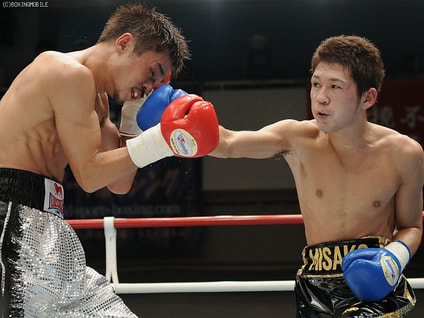 He would finish off 2011 by scoring what is still probably his best win to date, an 8 round decision over Kohei Kono. By that point in time Kono was a former Japanese and OPBF champion who had twice fought for world titles. He was going through a bit of a career crises, with back-to-back losses to Tomas Rojas and Yota Sato, but was less than 17 months removed from being the OPBF Super Flyweight champion. In fact Kono so far from being done that he would go on to claim his first world title just over a year later. Tobe was under a lot of pressure from Kono but used his jab brilliantly, moved fantastically and countered when he had the space to work with. It was a fantastic and mature performance from Tobe under extreme fire. In 2012 Tobe kicked off the year with a dominant win over Ryan Bito whilst eyeing up bigger and better opportunities. He was starting to get a lot of attention with those in the boxing media referring to him as the “Golden Rookie”. He looked like he was something special and his team knew it, putting him in with OPBF Super Flyweight champion Ryo Akaho in just his 5th professional bout. Some had suggested it was perhaps too early but given how impressive he had looked and the confidence of the fighter and his team, and in fact the history of the Misako gym, there didn't seem to be any doubt in putting him in with someone like Akaho this early in his career. Sadly for Tobe the bout against Akaho would see him suffer his first defeat. It wasn't all a case of being inexperienced but also the style match up, with Akaho's unorthodox, wild and aggressive style being too much for Tobe. Tobe's boxing, at times, looked good but he was never allowed the freedom to work as the tough Akaho trudged through his leather and bowled him over in round 8 to retain the title. 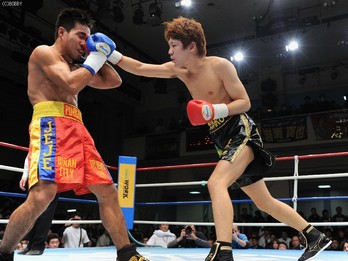 The loss seemed to show Tobe's biggest issue, it wasn't a lack of experience as such, but a lack of true natural toughness. It would be something that would be his undoing several years later as well. On his return to the ring in 2013 Tobe was held to an 8 round draw by the then unheralded Richard Pumicpic. The result was considered a major set back at the time, though since then Pumicpic has become a very appreciated fighter in and around the Oriental scene. He has given Ryosuke Iwasa fits in an OPBF title fight, gave Cesar Juarez a war in 2016, and claimed the WBO Asia Pacific Featherweight title in 2017 with a win over Hisashi Amagasa. With a loss and a draw in successive bouts Tobe was matched a little bit softly through the rest of 2013 whilst rebuilding his confidence. That saw him score wins against Chatchai Or Benjamas / Chatchai Or Benjamas, Ken Achiwa and Yoshihito Ishizaki. Of those only the win over Ishizaki was really note worth as it was in the Strongest Korakuen final and secured Tobe a shot at the Japanese Super Flyweight title in 2014. He would stop Ishizaki in 5 rounds to move on to that title shot, which saw him fight Taiki Eto for the vacant title, which had been vacated by Teiru Kinoshita ahead of Kinoshita's IBF world title bout with Zolani Tete.
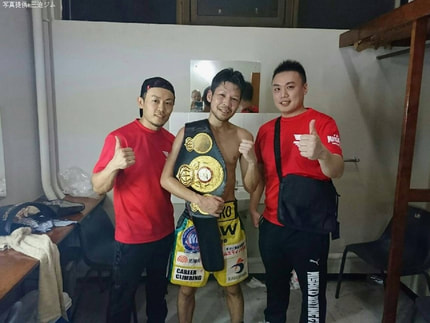 Much like the loss to Akaho it wasn't a lack of experience or skills that saw Tobe come up short against Rodriguez but instead his punch resistance and his inability to control the type of fight he was having. He was significantly bigger than Rodriguez, and should have used that to his advantage. He should have found a way to establish his jab, used his speed and boxed, but instead he got dragged into a war and couldn't deal with the fire power of Rodriguez. At the time of writing Tobe has a record of 13-3-1 (9) and is 31 years old. He turned professional at the age of 23 and had so much potential but now he sits as one of the biggest “what ifs” in Japanese boxing. What if he hadn't been thrown in with Akaho so early? What if he had avoided the momentum killing stretches of inactivity? What if he had racked up more experience before winning a Japanese title, and then taking a different route? There is no doubt in my mind that, with the right team behind him and some fortunate timing Tobe could have claimed a world title, the win over Kono just over a year before Kono stopped Tepparith Singwancha almost seems to prove that. Instead he had a 6 month reign as a Japanese champion and an inconsequential reign as the WBA International Super Flyweight champion. He showed touches of genius but instead of becoming part of the Golden Era he is likely best remembered for his time as the “Golden Rookie”. Tobe does still have time, his career isn't over, but it's hard to not think his best years are behind him and that he will never come close to what he could, and probably should, have been. (All images courtesy of boxmob.jp) |
Oriental Opinions
This is just an opinion, maaaan! It's easy to share our opinions, and that's what you'll find here, some random opinion pieces Archives
March 2024
Categories
All
|
 RSS Feed
RSS Feed
